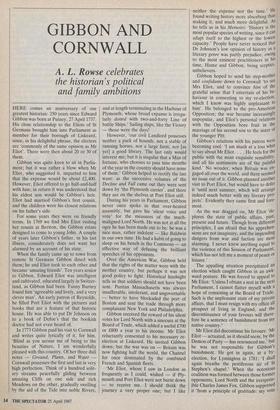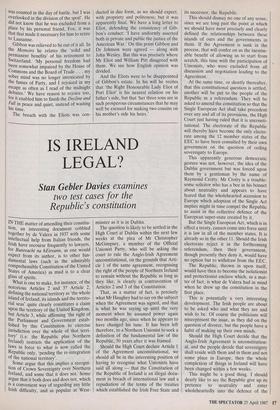GIBBON AND CORNWALL
A. L. Rowse celebrates
the historian's political and family ambitions
HERE comes an anniversary of our greatest historian: 250 years since Edward Gibbon was born at Putney, 27 April 1737. His close relationship to the Eliots of St Germans brought him into Parliament as member for their borough of Liskeard, since, in his delightful phrase, the electors are 'commonly of the same opinion as Mr Eliot'. There were then about 20 or 30 of them.
Gibbon was quite keen to sit in Parlia- ment; but it was rather a blow when Mr Eliot, who suggested it, imparted to him that the expense would be about £2,400. However, Eliot offered to go half-and-half with him; in return it was understood that his eldest son would be Gibbon's heir. Eliot had married Gibbon's first cousin, and the children were his closest relations on his father's side.
For some years they were on friendly terms. In 1769 we find Mrs Eliot visiting her cousin at Beriton, the Gibbon estate designed to come to young John. A couple of years later Gibbon's father, in his last illness, considerately does not want her alarmed by an account of his state.
When the family came up to town from remote St Germans Gibbon dined with them; he and Eliot took to each other and became 'amazing friends'. Ten years senior to Gibbon, Edward Eliot was intelligent and cultivated, educated largely in Switzer- land, as Gibbon had been. Fanny Burney found him 'agreeable and lively, and a very clever man'. An early patron of Reynolds, he filled Port Eliot with the pictures and books that are a feature of that historic house. He was able to put Dr Johnson on to a book of Defoe's that the bookish doctor had not even heard of.
In 1773 Gibbon paid his visit to Cornwall and writes quite lyrically of it, for him. `Blind as you accuse me of being to the beauties of Nature, I am wonderfully pleased with this country. Of her three dull notes — Ground, Plants, and Water Cornwall possesses the first and last in very high perfection. Think of a hundred solit- ary streams peacefully gliding between amazing Cliffs on one side and rich Meadows on the other, gradually swelling by the aid of the Tide into noble Rivers, and at length terminating in the Harbour of Plymouth, whose broad expanse is irregu- larly dotted with two-and-forty Line of battle Ships.' Sailing ships, like the Victory — those were the days!
However, 'our civil Landlord possesses neither a pack of hounds, nor a stable of running horses, nor a large farm, nor [as yet] a good library. The last only would interest me; but it is singular that a Man of fortune, who chooses to pass nine months of the year in the country should have none of them.' Gibbon helped to rectify the last want: as the successive volumes of the Decline and Fall came out they were sent down by 'the Plymouth carrier', and there they are on the shelves at Port Eliot still.
During his years in Parliament, Gibbon never once spoke in that over-heated assembly, but gave his 'silent voice and vote' for the measures of the much- maligned Lord North. He was not at all the ogre he has been made out to be: he was a nice man, rather indolent — like Baldwin in our own time. He had a habit of going to sleep on his bench in the Commons — an effective way of defusing the brilliant speeches of his opponents.
Over the American War, Gibbon held that the rights of the matter were with the mother country, but perhaps it was not good policy to fight. Historical hindsight tells us that soldiers should not have been sent. Puritan Massachusetts was always insufferable, intolerant, and ungovernable — better to have blockaded the port of Boston and sent the trade through more complaisant New York and Philadelphia. Gibbon received the reward of his silent votes for Lord North with a sinecure at the Board of Trade, which added a useful £700 or £800 a year to his income. Mr Eliot reluctantly consented to his necessary re- election at Liskeard. He invited Gibbon down; but the war was on — Britain was now fighting half the world, the Channel for once dominated by the combined French and Spanish fleets.
`Mr Eliot, whom I saw in London as frequently as I could, wished — if Ply- mouth and Port Eliot were not burnt down — to receive me. I should think the journey a very proper one; but I like neither the expense nor the time.' He found writing history more absorbing than making it, and much more delightful. As he tells us in his Memoirs: 'History is the most popular species of writing, since it can adapt itself to the highest or the lowest capacity.' People have never noticed that Dr Johnson's low opinion of history as literary genre was partly prejudice, owing to the most eminent practitioners in his time, Hume and Gibbon, being sceptics, unbelievers.
Gibbon hoped to send his step-mother and confidante down to Cornwall 'to see Mrs Eliot, and to convince him of the grateful sense that I entertain of his be- haviour in consenting to my re-election, which I know was highly unpleasant to him'. He belonged to the pro-American Opposition; the war became increasinglY unpopular, and Eliot's personal relations with the Opposition bore fruit in the marriage of his second son to the sister of the younger Pitt. Gibbon's relations with his patron were becoming cool. 'I am much at a loss what to say about Mr Eliot. . . . He feels for the public with the most exquisite sensibility, and all his sentiments are of the painful kind.' No wonder, when Britain was en- gaged all over the world, and there seemed no issue out of it. Gibbon planned another visit to Port Eliot, but would have to defer it 'until next summer, which will arrange indeed much better with my literary pro- jects'. Evidently they came first and fore- most.
As the war dragged on, Mr Eliot 'de- plores the state of public affairs, past, present and future. Though from different principles, I am afraid that his apprehen- sions are not imaginary, and the impending dangers from war and faction are most alarming. I never knew anything equal to the violence of this Session of Parliament, which has not left me a moment of peace or leisure.'
The appalling situation precipitated an election which caught Gibbon in an awk- ward posture. He was forced to appeal to Mr Eliot: 'Unless I obtain a seat in the next Parliament, I cannot flatter myself with a hope of remaining at the Board of Trade. Such is the unpleasant state of my private affairs, that I must resign with my office all prospect of living in England, and the discontinuance of your favours will there- fore be a sentence of banishment from my native country.' Mr Eliot did discontinue his favours: `Mr Eliot — actuated, as it should seem, by the Demon of Party — has renounced me,' but he was not responsible for Gibbon's banishment. He got in again, at a by- election, for Lymington in 1781: 'I shall again breathe the pestiferous air of St Stephen's chapel.' When the notorious coalition was formed between those former opponents, Lord North and the irrespons- ible Charles James Fox, Gibbon supported it 'from a principle of gratitude: my vote was counted in the day of battle, but I was overlooked in the division of the spoil'. He did not know that he was excluded from a place by his personal friend, Fox; it was that that made it necessary for him to retire to Lausanne.
Gibbon was relieved to be out of it all. In the Memoirs he relates the 'solid and permanent benefits' of his retirement to Switzerland. 'My personal freedom had been somewhat impaired by the House of Commons and the Board of Trade . . . my sober mind was no longer intoxicated by the fumes of Party, and I rejoiced in my escape as often as I read of the midnight debates.' We have reason to rejoice too, for it enabled him to finish the Decline and Fall in peace and quiet, instead of wasting his time.
The breach with the Eliots was con- ducted in due form, as we should expect, with propriety and politeness; but it was apparently final. We have a long letter to Eliot, defending the consistency of Gib- bon's conduct: 'I have uniformly asserted both in private and public the justice of the American War.' On this point Gibbon and Dr Johnson were agreed — along with John Wesley. But this was precisely where Mr Eliot and William Pitt disagreed with them. We see how English opinion was divided.
And the Eliots were to be disappointed of Gibbon's estate. In his will he recites that 'the Right Honourable Lady Eliot of Port Eliot' is his nearest relation on his father's side, but that 'her three sons are in such prosperous circumstances that he may well be excused for making two cousins on his mother's side his heirs.'



































































 Previous page
Previous page